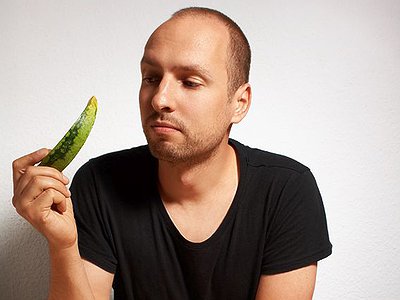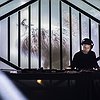Name: Stefan Goldmann
Nationality: German
Occupation: Producer, DJ
Current Release: Tacit Script on Macro
Recommendations: Céleste Boursier-Mougenot's 'The Curve', an installation for guitars and birds.
Steve Coleman & Five Elements: 'Def Trance Beat (Modalities Of Rhythm)'. Download for free here.
If you enjoyed this interview with Stefan Goldmann, visit his website or facebook account for more information, music and current live dates.
When did you start writing/producing music - and what or who were your early passions and influences? What what is about music and/or sound that drew you to it?
Music production developed for me as an extension of playing bass guitar as a teenager. I was particularly interested in the envelopes of sound and the connection between dynamics and the spectral properties of sounds. That is, a bass guitar is an instrument whose properties lie somewhere between percussion, melody and electronics. With different playing techniques you could shift a tone more towards different percussive behaviors, shortening or extending the 'release' of a tone, muting the harmonics or increasing the nonlinear parts of the spectrum when slapping or popping a string.
Working with a sampler or synthesizer is very similar in this way: it is mostly about controlling how spectrum and dynamics interact. Shaping envelopes in relation to a filter movement for instance is key – levels and spectral change get linked and become interdependent. So it felt quite natural for me to move into this field. The other motivating force was of course frustration with my own level of developing my capabilities as well as with finding like-minded band mates. In a rehearsal setting things never quite came together the same way as was possible in an electronic environment. I was thoroughly fascinated that you could program a loop and could surgically tweak its details while it was playing. Of course good musicians do something quite similar but they are much more constrained by physics and physiology. With a synthesizer you can almost zoom in to the actual particle in the middle of a waveform. I could see the actual sampling point on my screen and move it anywhere with a pencil tool – this was an absolutely incredible discovery for me: you could see and hear the absolute core of it. I don't think there are many things in life that allow you to get this close.
For most artists, originality is first preceded by a phase of learning and, often, emulating others. What was this like for you? How would you describe your own development as an artist and the transition towards your own voice? What is the the relationship between copying, learning and your own creativity?
Oh yes. I don't think we plan to be individual. Ideally, we'd like to copy things we like. When kids form their first band, they typically don't try to revolutionize anything. They try to sound exactly like some benchmark band or musician, but they never quite succeed. Some get stuck there, others take it and go with the flow.
In other words human effort is often aimed at imitation, but since imitation is never perfect, change is inevitable. Think of a master potter and the potter's apprentice. The apprentice strives to replicate the techniques and products of the master. The basics are quickly learned, but the finer details are shaped by an endlessly complex feedback mechanism between a person and whatever they are doing, emerging over years of practice. Thus the closer the apprentice matches the master's skills the harder this acquisition process becomes. Eventually it is impossible for the apprentice to get the exact same results. Maybe out of frustration, almost by mistake, the apprentice will discover new things while trying to figure out the routines of the master. Thus a common ground, some formal basics remain quite firmly in place because they define a stable goal in that field, but there will always be innovation for the simple reason that you can't quite take the place of those that came before you.
That's my story too. Initially I was more drawn to drum'n'bass, but I also discovered techno mostly through Jeff Mills and Cristian Vogel, and some house music such as MAW or Jesper Dahlbäck. I didn't start with Chicago, but with much later developments that already had gone through one cycle of imitation and deviation. So I tried drum'n'bass and couldn't get very far with the gear I had, and it felt impossible to add anything meaningful to techno. So I figured house could be considered low hanging fruit by comparison, from a production point of view that is. It felt less rigid. And I did get results very very quickly. I believe the first records I released for Classic and MMF in the UK contained tracks that were maybe my third or fourth efforts of producing house music. I have this track 'Missing Days' for example. I tried to sound like MAW, but it didn't come out quite like that. Because of limitations of my set up and skill set I ended up doing a very reduced, minimalistic version of house. I already had a quite good command of programming shuffle at that time – that is, of designing the phrasing or microrhythmic grid of a groove. I didn't know anything about compression and not much about synthesis back then, so there aren't any. 'That Ghost' is probably the most significant track I did around that time, since it consists of the absolute bare minimum: bass drum, hihat, snare, two bass notes and a rhythm guitar noise of around half a second – that's it.
There is this saying, “To a man with a hammer every problem looks like a nail.” Once you buy more gear and learn more skills the inclination of showing these off creeps up, and I feel that's what maybe happened to my later output of around 2004 maybe. Ironically the earlier 'reduced house' sound would become relevant a lot later, when I had mostly moved on to other ideas. I think I learned to overcome the 'man with the hammer' syndrome quite quickly and I'm mostly happy with anything I did since 2005 or so. I don't need to show off any skill or piece of gear anymore, including the capability of producing minimal house.
What were your main compositional– and production-challenges in the beginning and how have they changed over time?
My view of electronic music was that techno in the form of Jeff Mills's works was at the pinnacle of composition, and drum'n'bass by the likes of Matrix or Optical was at the pinnacle of production and engineering. I mean, looking at something like Jeff Mills's 'Growth' is like standing at the foot of Mount Everest. If that's the definition of what techno can be there's nothing to add really. And so I didn't even bother trying. Drum'n'bass was very competitive and dynamic at the time, so there wasn't much hope with catching up anytime soon, as the apprentice which I was. But it seemed penetrable – it appeared possible to figure out what they were doing. Probably the most fascinating part for me was the engineering in terms of how everything came together – mix, spatial placement, dynamic interaction, beat design. In a way I have been trying to transfer that to techno ever since.
I have a friend who developed a similar interest at the same time, from the same vantage point – he was the drummer in our dysfunctional band – but his focus was less on track programming and mixing, but rather on synthesis. His name is Mike Daliot and he ended up going down the rabbit hole until he came out on the other side of it and programmed the 'Massive' synth for Native Instruments. He basically programmed his own software to take drum'n'bass-style bass synthesis to the next level, and that thing wrote dance music history. My goals were less totalitarian I guess.
So that's been the production challenge: catching up with those who came before and always considering where it needs to go next. With time I became skeptical of the idea of production as the dominant viewpoint to defining composition or aesthetics though. While it is certainly true that the range of possibilities inherent in the technical means will eventually define the style, I felt that the potential of this line of thought had been somewhat exhausted for electronic music by the year 2000 – which is basically when I began. It's a bit like arriving too late to a party, just when the bar has been emptied. Maybe as a result I became much more concerned with other levels of aesthetics rather then handling gear.




